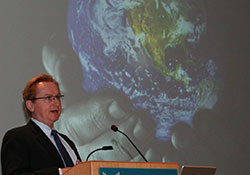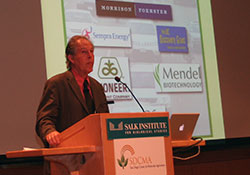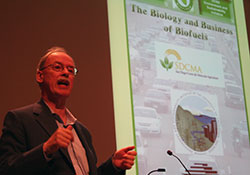Part of the Solution: UCSD Organizes Conference to Discuss Developing Biofuels to Replace Dependence on Oil
February 4, 2008
Media Contact: Paul K. Mueller

Steve Kay, Dean of the Division of Biological Sciences at UCSD, opened the three-day "Biology and Business of Biofuels" symposium. "We all want to be part of the solution," he said.
Biological Sciences Dean Steve Kay sums up the UCSD biofuels conference in an interview with KPBS's These Days -
UCSD Biofuels Press Workshop: Explore innovative, interdisciplinary research efforts focused on discovering new sources of biofuels and efficient ways make them a feasible, long-term solution to our energy needs -
More than 300 scientists and business leaders from around the country met last week to discuss ways of developing new biofuels to help replace our dwindling oil reserves and mitigate some of the impacts of climate change.
"Biologists can save the world," said Steve Kay, dean of the UCSD Division of Biological Sciences, in his introduction to the symposium on "The Biology and Business of Biofuels". But he acknowledged that investment in biofuels research will need a dramatic boost before plants and algae can contribute significantly to the world's demand for energy.
Despite the recent media buzz about corn-based ethanol and biodiesel from canola and soybeans, the green alternatives to petroleum probably won't involve food crops but, rather, perennial grasses, tree crops and algae, researchers said. Speaker after speaker explained both the existing science and the expected avenues of exploration for terrestrial and aquatic biomass - and expert after expert emphasized that lack of money is hampering basic and applied research.
Judging by the event's sponsors - Wells Fargo, Morrison Foerster, Sempra Energy Utilities, Cibus, Pioneer, Mendel Biotechnology and others - the business and banking worlds also recognize the promise of biofuels and the urgent need for increased research funding.

Richard Somerville of UCSD's Scripps Institution
Given UCSD's existing expertise in biofuels-related sciences, the prominence of university speakers at the symposium was not surprising. Besides Kay, UCSD was represented by Maarten Chrispeels and Steve Briggs, professors of biology; Bernhard Palsson, professor of bioengineering; and Richard Somerville, B. Greg Michell and Jeff Severinghaus of the Scripps Institution of Oceanography.
The UCSD-organized symposium was held on the modernistic campus of the Salk Institute. The topics of the talks give some idea of the scope of the ideas swirling around the meeting hall and their interdisciplinary nature: The science of climate change as influenced by atmospheric gases; biofuels from new biomass crops and from algae; the ecological consequences of a biomass revolution in agriculture; the need for synthetic bacteria to convert sugars directly into gasoline-like molecules.
Symposium participants got the clear impression that the time for action is now, because the choices are being forced upon us: Food or fuel? Land for biofuels or land to feed cattle? Expensive gasoline or mass transport?
Their colleagues - from such diverse institutions as Stanford University, the Verenium Corporation, DuPont, the University of Minnesota, the University of Lund (Sweden), Synthetic Genomics Inc., explained the current and coming science of biomass and the business of biofuels.
Speaking from Washington, D.C., Congressman Nick Lampson, the chair of the Subcommittee on Energy and Environment of the House Committee on Science and Technology, addressed the symposium and discussed the initiatives that were recently enacted and are now in the pipeline.
From the ecological impacts of a global biomass revolution to advanced fuels produced by genetic engineering of organisms, from the economic impacts of biofuels and the current biofuels investing prospects to the picture from Washington, D.C., the symposium fulfilled its dual biology-and-business clarifying purpose.

Chris Somerville of Carnegie Institution/Stanford
That success, says Kay, is due in large measure to the "tireless and inspiring efforts" of Lisa Shaffer, the executive director of UC San Diego's Environment and Sustainability Initiative, and Maarten Chrispeels, who directs UCSD's Center for Molecular Agriculture. Both worked together to organize and host the symposium.
"We all want to be part of the solution," said Kay to open the meeting. Chrispeels, in later remarks, expanded on that idea. "It is important for the public to understand that many parallel approaches are needed to mitigate global climate change," he said, "and that biofuels can have a considerable impact, especially here in California where transportation accounts for 40 percent of our carbon dioxide release."
See Also: The Promise of Biofuels
